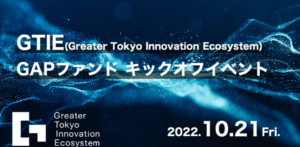Event
GTIE GAP Fund Kickoff Event to be Held

*This event is co-located with ACADEMIA ENTREPRENEUR SUMMIT 2022 organized by Forbes JAPAN.
The Greater Tokyo Innovation Ecosystem, a project of the Japan Science and Technology Agency’s “University Ecosystem Promotion Type (Startup Ecosystem Formation Support),” aims to create and foster university-launched venture companies to generate innovation and new industries. GTIE supports entrepreneurial activities by providing multifaceted support for the commercialization of venture companies in the pre- and post-startup phases. GTIE aims to accelerate the implementation of university research and human resources into society, with GTIE serving as a platform.
The GTIE GAP Fund Kick-off Event is an opportunity to showcase the research teams and R&D projects that have been selected for GAP Fund 2. The event also aims to promote the formation of a startup ecosystem by providing networking opportunities and lectures by experts for exchange within and outside the GTIE platform. The event aims to promote the formation of a startup ecosystem by providing opportunities for networking and expert lectures for exchange within and outside of the GTIE platform.
[ Event Summary ]
Date: Friday, October 21, 2022
Time: 15:05-19:10
Venue: SHIBUYA QWS *Online delivery
To register, please click here.
* GTIE : https://gtie-gapfund-kickoffevent.peatix.com/
[ Concurrent Events ].
ACADEMIA ENTREPRENEUR SUMMIT 2022
Click here to register
* Forbes : https://forbesjapan.com/feat/aesummit2022/
[Program ]
15:05 Opening
15:21 GTIE Pitch 1 – GX & Materials Segment
16:01 GTIE Panel Session 1
16:30 GTIE Pitch 2 – Life Sciences (Drug Discovery and Medical Devices) Segment
17:16 GTIE Pitch 3 – Life Sciences (Drug Discovery and Medical Devices) Segment
17:40 GTIE Panel Session 2
18:05 GTIE Pitch 4 – DX Segment
18:37 GTIE Panel Session 3
19:02 Closing
[GTIE Pitch 1 – GX & Materials Segment ]
Chiharu Tokoro
Professor, School of Science and Engineering, Waseda University
Creation of a New Circulation Value Chain for Lithium Ion Batteries Using a Novel Electric Pulse Method
Toshiaki Tanaka
Assistant Professor, School of Bioscience and Biotechnology, Tokyo Institute of Technology
Applied Biomatrix Entrepreneurship Project
Sachiko Matsushita
Associate Professor, School of Materials Science and Engineering, Tokyo Institute of Technology
Verification of commercialization of semiconductor sensitized thermal power generation buried in a heat source
Shuntaro Uenuma
Assistant Professor, Graduate School of Frontier Sciences, The University of Tokyo
Commercialization of Nanosheets Composed of Cyclic Oligosaccharides
Kenta Hirayama
Student (Ph.D.), Graduate School of Science and Technology, Keio University
Validation of AI-based Nondestructive Inspection Method for Carbon Fiber Reinforced Plastic Parts Using Measured Data
[ GTIE Pitch 2 – Life Science (Drug Discovery and Medical Devices) Segment ]
Kumiko Cheng
Associate Professor, Graduate School of Science, The University of Tokyo
Development and practical application of siRNA that suppresses only disease-causing mutant genes
Motonori Hayano
Project Lecturer, Department of Neuropsychiatry, Faculty of Medicine, Keio University
Aging Drug Discovery Platform and Development of Therapeutic Drugs for Sarcopenia
Tsutomu Omatsu
Associate Professor, Faculty of Agriculture, Tokyo University of Agriculture and Technology
Commercialization of Biopharmaceutical Production Platform Using Acid-tolerant Microalgae
Yuriko Gyobu
Professor, School of Bioscience and Biotechnology, Tokyo Institute of Technology
Development of Basic Technology for Novel Domestically Produced Genome-Edited TiD
Satoshi Endo
Assistant Professor, Graduate School of Frontier Sciences, The University of Tokyo
Drug Discovery of Ultra-small RNA-binding Proteins
Sadao Ota
Associate Professor, Research Center for Advanced Science and Technology, The University of Tokyo
Commercialization of Pooled and Comprehensive Cell Phenotyping Technology
Weilun Xu
Lecturer, Graduate School of Engineering, The University of Tokyo
Development of molecular sequencer using nanopores
Shinji Ikeuchi
Professor, Institute of Biomaterials and Bioengineering, Tokyo Medical and Dental University
Development of Automated Assisted Reproductive Technology System for Infertility Treatment
[GTIE Pitch 3 – DX Segment ]
Tomoyoshi Hayakawa
Student (Master), School of Environmental and Social Science and Engineering, Tokyo Institute of Technology
Visualization of train congestion and realization of a society where passengers can ride cheaply, reduce congestion, and travel with peace of mind (STEP2)
Yasushiro Kishimoto
Project Professor, Keio University School of Medicine, Hills Future Preventive Medicine and Wellness Collaborative Research Chair
Accuracy verification and business validation in practical situations using dementia detection technology in acoustic analysis
Taichi Kim
Project Associate Professor, Graduate School of Medicine, The University of Tokyo
Development of Mixed Reality Surgery Support Software that Integrates Preoperative and Intraoperative Information
Kenji Suzuki
Professor, Institute for the Creation of Science and Technology, Tokyo Institute of Technology
Short-term Development of a Diagnostic Support System Using Small Data AI for a Wide Variety of Products: A Study of the U.S. Market
* Click here for more information about the selected teams.
[GTIE Panel Session 1 ]
Makoto Saeki
Co-Founder, EVERSTEEL Corporation
Naoki Watarai
Co-Founder, CEO digzyme Corporation
[GTIE Panel Session 2 ]
Nobuyuki Arakawa
President and CEO, Cereid Therapeutics Corporation
Yuji Otsuki
CEO and Representative Director, FerroptoCure Co.
[GTIE Panel Session 3 ]
Akira Jinguji
Representative Director, Spice Engine Co.
Michele Guaranieri
CEO, hibot Co.
Yu Yamashiro
Representative Director, Jij Corporation
[What is GTIE ]
Greater Tokyo Innovation Ecosystem (GTIE)” is a platform for “fostering university-launched startups that change the world” led by the University of Tokyo, Tokyo Institute of Technology and Waseda University. GTIE aims to nurture and create university-launched startups that can compete globally. GTIE will build an ecosystem in collaboration with universities, local governments, private companies, VCs, accelerators, and other organizations participating in the “Startup Ecosystem Tokyo Consortium”.